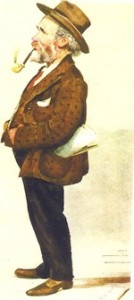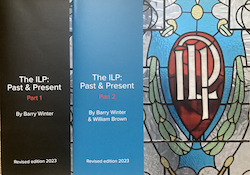An Introduction to the ILP’s history
The ILP (Independent Labour Party / Independent Labour Publications) has a long and varied history, one which is not easy to summarise accurately and adequately.
Here, we offer a brief introduction to our history and provide a short reading list. If you want to read more about the ILP’s history, you can purchase our pamphlets, The ILP: Past & Present, from our Publications page.
The ILP was founded in 1893 on the initiative of local socialists, mainly from Scotland and the north of England and encouraged by such national figures as Keir Hardie (editor of the Labour Leader) and Robert Blatchford.
In 1900 the ILP played a key role in founding the Labour Representation Committee, which became the Labour Party in 1906. Initially the membership of the Labour Party came through either the trade unions or the affiliated socialist societies – primarily the ILP.
To begin with the ILP provided Labour’s grassroots activists and a significant number of its parliamentarians. However, in 1918 this changed. Thereafter, the Labour Party introduced its own individual membership, although the ILP retained the right to hold its own conferences and determine its own policies, even when they ran counter to Labour’s. Indeed, the ILP strongly opposed Britain’s entry into the First World War, whereas Labour supported the war effort.
Increasingly there were disagreements between the Labour Party, particularly its parliamentary leadership, and the ILP rank and file. In the 1920s, the divergence of views was exemplified by the ILP members’ support for guild socialism and the virtual licence given to GDH Cole to promote these radical ideas via the ILP.
In 1922 a number of Scottish radicals, including Jimmy Maxton and John Wheatley, became ILP MPs. This heightened tensions within the Labour Party as its leaders became increasingly absorbed in the parliamentary political system. Following the debacle of the first Labour government, ILP candidates in the 1931 general election refused to accept the Labour Party’s standing orders, and in 1932 the ILP disaffiliated from Labour.
Thereafter, ILP membership fluctuated and, in time, started to decline, yet the ILP continued to be active in domestic politics and numerous support groups linked to freedom fights in Africa and elsewhere. It organised a socialist contingent to fight with the republicans in the Spanish Civil War (catalogued in Homage to Catalonia by George Orwell who served with the ILP).
Just as it had in its earlier days, it continued to oppose colonialism, imperialism, Stalinism and rampant capitalism, and campaigned at home for a living wage, for numerous radical welfare reforms, for workers’ rights and for women’s suffrage.
In the 1950s its members became active in the peace movement, especially in the Campaign for Nuclear Disarmament and the Committee of 100 headed by Bertrand Russell, who was at one time a member of the ILP himself.
In the 1960s the ILP campaigned against racism, South African apartheid and the Vietnam War. Its members were active in the trade union movement, community groups and tenants’ associations, and in the 1980s they helped organise opposition to the Poll Tax and support for miners’ families during the protracted miners’ strike of 1984/5.
 In 1975 the ILP ceased to be the Independent Labour Party and reconstituted itself as Independent Labour Publications, a political pressure group combining a parliamentary and extra-parliamentary perspectives for democratic social change. Thereafter, ILP members were free to join the Co-operative Party, and were positively encouraged to join the Labour Party and become involved in all aspects of its work. Membership or support for other political parties or groups was not accepted.
In 1975 the ILP ceased to be the Independent Labour Party and reconstituted itself as Independent Labour Publications, a political pressure group combining a parliamentary and extra-parliamentary perspectives for democratic social change. Thereafter, ILP members were free to join the Co-operative Party, and were positively encouraged to join the Labour Party and become involved in all aspects of its work. Membership or support for other political parties or groups was not accepted.
Some time later ‘Friends of the ILP’ was established to make links with people who agree with part or most of the ILP’s perspective, but cannot, for one reason or another, join us as members.
Today the ILP seeks to encourage a democratic and radical political culture, and to help build a movement within and around the Labour Party that faces up to the challenges of our times. We may not always agree with what they said and did, but we remain linked to our forerunners, not only by the continuity of the ILP organisation but by our commitment to work for a more humane, equitable, democratic, progressive and tolerant world.
You can read more about the current ILP and its political perspective here.
—
The ILP: Past & Present
For a fuller introduction to the ILP’s history, you cannot do better than the latest version of our own pamphlet, The ILP: Past & Present, which is available in two parts from our publications section.
 Published in 2023, the ILP’s 130th anniversary year, the two publications provide a brief but revealing portrait of the ILP’s history and politics.
Published in 2023, the ILP’s 130th anniversary year, the two publications provide a brief but revealing portrait of the ILP’s history and politics.
Part 1, published in June 2023, traces the the ILP’s story through the ups and downs of its development in the early decades of the 20th century, including its role in founding Labour, its fateful decision to leave the party in 1932, and its support for causes such as the living wage, the general strike and the Spanish Civil War.
Part 2 covers the second half of the ILP’s history from the post-war period, when it struggled to retain political relevance, to 1975 when it made a principled decision to return to the Labour Party as Independent Labour Publications.
It goes on to chart the turbulent Thatcher years when the ILP developed a distinctive approach to Labour and political change that was often at odds with the rest of the left. Over the last 30 years the ILP has continued to provide an independent left voice within and outside the party – whether under new Labour, Ed Miliband, Jeremy Corbyn or Keir Starmer.
Through all its shifting shapes and fortunes, what comes across most clearly in these publications is the survival of the ILP’s core concern – to help create a society of peace, fellowship and security, where all have an equal chance to develop and thrive.
The 2023 edition is a revised and updated version of the first edition of The ILP: Past & Present, also written by Barry Winter and published to coincide with our centenary celebrations in 1993. The original version is now sold out, but you can read all of the main sections online here.
—
ILP Profiles
In 2013 the ILP celebrated its 120th anniversary by publishing a series of online profiles of past ILPers. Some are famous names from Labour history, such as Keir Hardie and James Maxton; others are less well known figures, local activists and campaigners whose role in the Labour movement has largely been forgotten, such as Ada Salter in south east London and Hannah Mitchell in the north west.
Links to all those profiles can be found here.
You can also find them by typing ‘ILP Profiles’ in the search function above, clicking ‘ILP Profiles’ from the ‘Tag Cloud’ in the right-hand column, or selecting the ‘History’ section under ‘Articles’ on the main menu.
—
Further Reading
There are many other publications on aspects of ILP history and biographies of famous ILPers. Here are a few we recommend:
- Logie Barrow & Ian Bullock, Democratic Ideas and the British Labour Movement, 1880-1914
- Caroline Benn, Keir Hardie
- Fenner Brockway, Bermondsey Story: The Life of Alfred Salter
- Fenner Brockway, Inside the Left
- Fenner Brockway, Socialism over sixty years – the life of Fred Jowett of Bradford (1864-1944)
- Gordon Brown, Maxton
- Pauline Bryan (ed.), What Would Keir Hardie Say? and Keir Hardie & the 21st Century Socialist Revival
- Ian Bullock, Under Siege: The ILP in the Interwar Years
- Jon Cruddas, The George Lansbury Inaugural Memorial Lecture: ‘George Lansbury, the ILP & a Reimagined Labour Party’
- David Clark, Colne Valley: Radicalism to Socialism
- Gidon Cohen, The Failure of a Dream: The Independent Labour Party from Disaffiliation to World War II
- RE Dowse, Left in the Centre
- Christopher Hall, ‘Not Just Orwell’: The Independent Labour Party Volunteers and the Spanish Civil War
- June Hannam, Isabella Ford
- James Hinton, Protest and Visions: Peace Politics in 20th Century Britain
- Bob Holman, Keir Hardie: Labour’s Greatest Hero?
- David Howell, British Workers and the ILP 1888-1906
- David James, Tony Jowett & Keith Laybourn (eds.), The Centennial History of the Independent Labour Party
- William Knox, James Maxton
- Keith Laybourn & Jack Reynolds, Liberalism and the Rise of Labour
- Jill Liddington, The Life and Times of a Respectable Rebel: Selina Cooper, 1964-1946
- Jill Liddington & Jill Norris, One Hand Tied Behind Us
- Alan Mackinlay & RJ Morris, The ILP on Red Clydeside: From Foundation to Disintegration
- David Marquand, Ramsay MacDonald
- Keith Middlemass, The Clydesiders
- Hannah Mitchell, The Hard Way Up: the Autobiography of Hannah Mitchell, Suffragette and Rebel
- Kenneth O Morgan, Keir Hardie, Radical and Socialist
- George Orwell, Homage to Catalonia
- Henry Pelling, The Origins of the Labour Party
- Henry Pelling, A Short History of the Labour Party
- Ben Pimlott, Labour and the Left in the 1930s
- Gred Reid, Keir Hardie: the making of a socialist
- Sheila Rowbotham, Edward Carpenter: A Life of Labour and Love
- Paul Salveson, Socialism with a Northern Accent: Radical Traditions for Modern Times
- Jon Scheer, George Lansbury
- Sarah Stanley Holton, Feminism and Democracy
- Carolyn Steedman, Childhood, Culture and Class in Britain: Margaret McMillan 1860-1931
- E P Thompson, ‘Homage to Tom Maguire’, in Briggs and Saville (eds.), Essays in Labour History vol. 1
- Peter Thwaites, Waiting for the Workers: A History of the ILP 1938-1950
- Chusichi Tsuzuki, Tom Mann: The Challenge of Labour
- Joseph White, Tom Mann
- Ian Wood, John Wheatley
—
ILP Archives
Some of the ILP’s archives are held at the London School of Economics where they can be viewed by arrangement. You can see the archive section of the LSE website here.
Here, the politics curator of the LSE Library talks about the importance of the ILP archives and explains how to access them.
Some ILP material is also held at the Working Class Movement Library in Salford, see www.wcml.org.uk.
—-